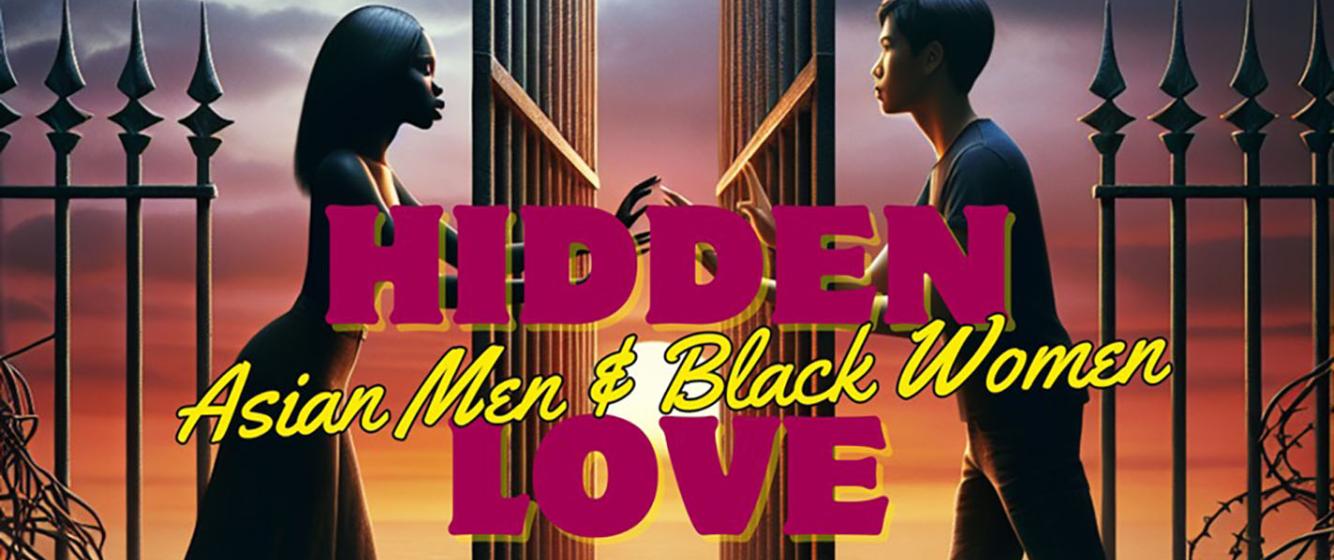
An AI generated AMBW banner (courtesy Tawanza Farmer).
Asian Man, Black Woman (AMBW): Transpacific love emerging from the Shadows (part 1 introduction)
"If dating were an assortment of Halloween candy, Black women and Asian Men would be the Tootsie Rolls and candy corn — the last to be eaten, if even at all."
Issa Rae, The Misadventures of Awkward Black Girl (2015)
Introduction
Issa Rae, the creator of the African American themed series Insecure, jokingly expressed in her memoir The Misadventures of Awkward Black Girl (2015) that Black women and Asian men should date one another since they are at the bottom of the dating totem pole. This quote surfaced a few years later, and brought her much criticism for suggesting that successful Black women are not sought out by Black men.
But Rae was only pointing out an uncomfortable truth about dating in America (also applicable to Australia). Often talked about, and sometimes becoming public, is the debate within Black and Asian communities about the unbalanced nature of interracial dating. A now deleted blog post from OKCupid dating site co-founder noted how user data showed that most men rated Black women as less attractive than women of other races and ethnicities. There have been media articles on how this affects Black women’s self-esteem. Similarly, Asian men fell at the bottom of the preference list for most women, and feel invisible on dating apps.
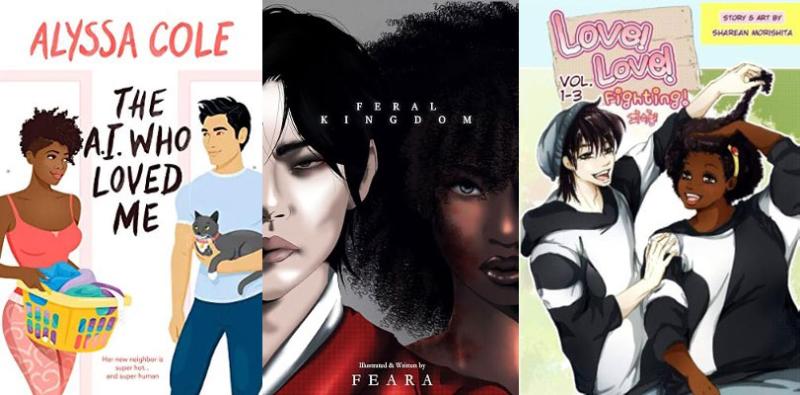
_
AMBW (Asian Male, Black Woman) fiction has enjoyed a surge in popularity, spawning a slew of romance novels and manga.
Interracial relations relationships have been happening since the nineteenth century between Asian men and Black women. So this is not a new phenomenon (we will get into this later). But fast forward to 2024 and do a Google search on the term AMBW (Asian Man, Black Woman) or the term BWAM (Black Woman, Asian Man). Then, watch the myriad of images of Black women and Asian men as couples on book covers. AMBW fiction has become popular, portraying romances between couples of these ethnicities. The genre includes everything from comic books to films to adult novels. AMBW has made Rae’s suggestion seem prophetic.
What can we unpack from the rise of AMBW fiction?
The following is part one of a conversation between Jayson Chun, a professor of history and co-editor of this Pop Pacific blog and Tawanza Farmer who will be a graduate student in Second Language Studies at the University of Hawai'i at Manoa this fall. Ms. Farmer has extensive experience with Korean studies, and revealed to Dr. Chun the existence of AMBW fiction, which has led to this post.
This is such a new and somewhat controversial topic for some people that we can only barely scratch the surface in a single post. Feel free to contribute in the comments.
Introducing AMBW, the newest romantic pairing of the 21st Century
There are now Youtube channels showcasing the rising AMBW pairings in the media.
Farmer: So what is AMBW? It is a literary genre branching from fanfiction to adult novels. It explores the romantic and/or sexual relations between a man of Asian ancestry and a woman of African ancestry. Typically the couple navigates issues like stereotyping, miscommunication, and insecurity. The biggest contributors and consumers of the AMBW genre are Black women. Goodreads users generated a list of over 180 books in this genre with some books dating back to 2004.
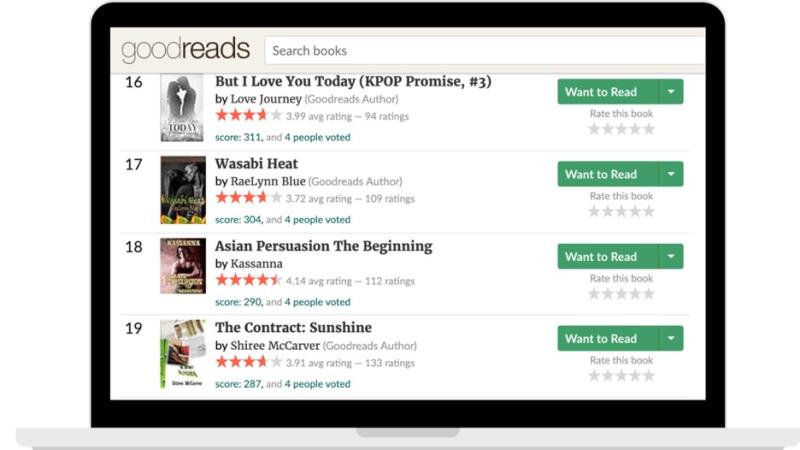
_
AMBW fiction can be found on book sites such as Goodreads
Depending on the form the genre takes, it can also represent the “Pop Pacific,” a transnational culture encompassing the United States, Korea, and Japan. Some forms it appears in are: romance novels featuring yakuza male leads, comic books drawn in a manga or webtoon style, fanfiction of K-pop idols, and inclusion of Konglish and Japanglish for cool appeal.
For example: in a potential AMBW plot, a Black woman, who is a fan of a K-pop group, meets a certain K-pop star by fateful encounter, and they end up becoming lovers.
Chun: This is (pardon the pun) the marriage of Black culture with K-culture.
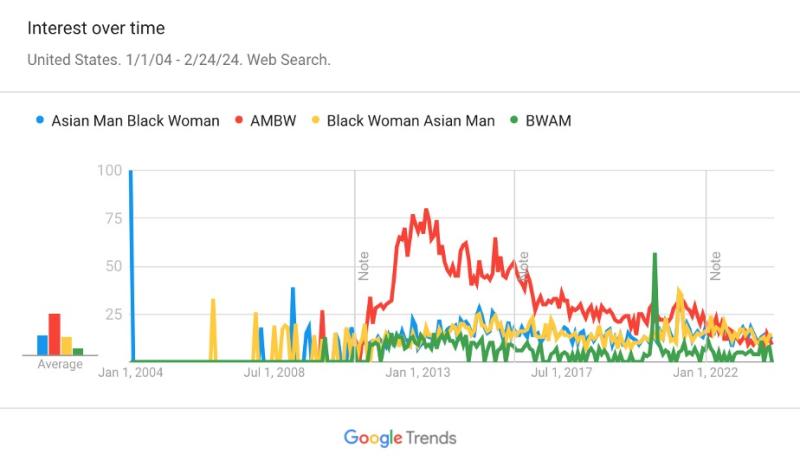
Farmer: Ha ha. How funny, but also how true. This graph shows the trends for the terms “Asian Man Black Woman” (blue line) in 2004, when Google started tracking trends.
The term “AMBW” (red line) gained traction by 2011, coincidentally when K-pop started becoming popular in the U.S. In May of that year, the term also appeared in the Urban Dictionary. The term BWAM (green line) trended in 2020.
Brandy and Paolo Montalban in the 1997 version of Rodgers and Hammerstein's Cinderella was among the first mainstream media representations of AMBW.
Chun: This genre seems to have come into being around 2004.
Farmer: Actually, AMBW fiction appeared much earlier than that! My first introduction was watching a Cinderella that looks like me in the VHS tape version of Disney's and Rodgers and Hammerstein's 1997 production, Cinderella. Beautiful and soft-spoken Brandy, a Black popular R&B vocalist and actress of the 1990s, is forced to dream in a mansion where she works as a servant to her stepmother and stepsisters until a chance meeting with the handsome Filipino prince, Paolo Montalban. I still get teary-eyed to this day while they sing “Do I love you because you’re wonderful, or are you wonderful, because I love you?” Little Black girls growing up in the 2000s looped that VHS tape as a ritual to escape the absence of magic in our everyday lives. As an unintended bonus, we dreamt of a handsome Asian prince meeting us as an equal and giving us loving respect.
Chun: This seems to be the first mainstream representation of an AMBW romance.
Farmer: But so much is happening outside the mainstream. AMBW fictions center Black Women and Asian men as people who deserve love and romance. I love AMBW works by comic artist Sharean Morishita, who has authored 5 webtoons and 3 comic book series that largely focus on AMBW. Alyssa Cole’s novel The A.I. Who Loved Me has an Audible audiobook voiced by Regina Hall and Mindy Kaling. I also like Feara W, my personal favorite, and her Feral Kingdom series, set in a historical fantasy medieval setting like Game of Thrones, where two lovers from warring ethnic groups based on Asian and African descended people, form a marriage contract and have to overcome their past traumas, racist societies, and ethnic warfare.
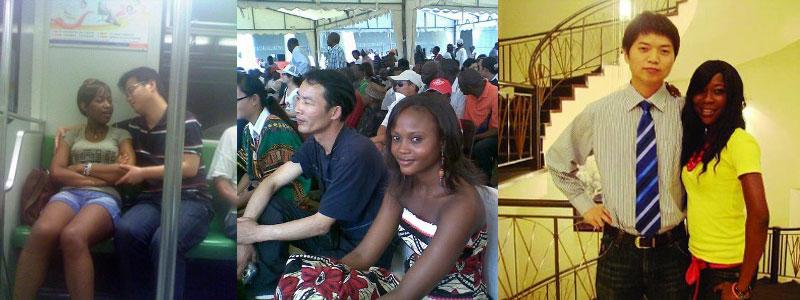
Photos from Pinterest “Chinese Men with Black Women & African Wives"
Website showing photos of Chinese men and & African Wives
Chun: Sounds like a K-drama plot! So this is mainly an American phenomenon? Or a transpacific phenomenon? Part of the appeal in Asia is that there are very few Asian men even out marrying other people. So there is curiosity about what international marriages are like. That is why a live streaming site about a Chinese male and his Cameroonian wife gained much popularity in China in 2018. My guess is that given the gender imbalance in China, where there are too many men and fewer women, and given the Chinese workers in Africa because of the government’s Belt and Road Initiative, Chinese men are exploring the possibilities of marrying African women.
Farmer: Recently I’ve also noticed fan pages dedicated to reposting photos of AMBW couples. There was a boom in social media accounts showing “interracial” or “international” couples that consist of Asian Men and Black Women on sites like Instagram, YouTube, TikTok, and Douyin. Some couples lived in the country of the male, like Korea or China, and others the country of the woman, like America.
Chun: But what about the United States, which is now beginning to acknowledge interracial relationships in the media?
Farmer: AMBW is mainly a genre created by Black women for Black women. I doubt many Asian men are reading AMBW romances, because Black women are centering themselves as the protagonists in these stories. They create the Asian male lead as handsome and strong, but unexpressive, and the Black woman lead as beautiful and strong, but resilient, so the two battle the evils of their past and/or racism through their love and companionship with each other. I’m not sure this would be that popular in mainstream American media, since it partially opposes how they are typically portrayed.
Chun: Sounds logical. But then, what if the main audience for AMBW is not Black women? Maybe it is women of other races who are voyeuristically reading about a forbidden romance between two “exotic” people not often seen in real life? I don’t know. But for now, let’s assume the audience is Black women, until we can get more data.
The popularity of Asian men and Black women
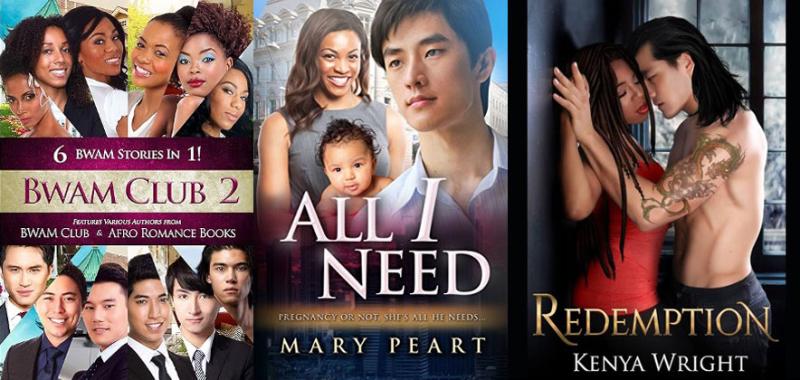
_
Asian Men have emerged as an object of desire in AMBW (or BWAM) fiction, as seen by these self-published novels.
Chun: Most people in the US will not marry out of their race. So why are Black women imagining themselves in relationships with Asian men, the least desirable (until now) males in the US dating scene?
Farmer: Each person is different and likes different things. AMBW offers a Black woman a chance to envision a wider range of people to date, reflecting how diverse the U.S is. Plus more Black women have grown accustomed to the rising influence of Asian media which results in seeing more attractive men from those countries. Of course, there’s quite a bit of controversy with things like AMBW due to the potential for fetishization. We need to guard against this potential by avoiding exoticizing each other.
Chun: Yes, that's a key point. We need to be wary of the possibility of fetishization where Asian men and Black women can be exoticized.
Anyway, Asian Americans now make up 7% of the US population. And K-pop has pushed handsome Korean men like BTS into the mainstream. So AMBW fiction gives Black women an opportunity to explore romance past traditional racial boundaries.
So how does AMBW represent Black and Asian attempts to break out of romantic marginalization?
Farmer: Well, look at how both groups are looking for a safe space. Both ethnic groups have been considered negatively in the global Eurocentric culture which values a certain visual standard of white skin, double eyelids, small noses with defined nose bridges, tall, muscular bodies for men, slim, frail bodies for women, and smooth, light colored hair. Since both groups are not perfectly suited to that beauty standard, members of them that are raised in Europe or North America are often raised to feel insecure of their features. This can lead to low self esteem for both groups.
Chun: That’s why it is good to see people writing AMBW fiction, because although these pairings are still rare in real life, it says that these romances are possible. Pop culture is often the first step in allowing people to imagine new social relationships.
Farmer: Earlier we mentioned AMBW marriages during the 1800s. Luke Tsai tells the story of Chung “John” Yick and his wife Cynthia Monki, “Mrs. Yick”. They married December 15th, 1900 after her first Chinese husband passed away leaving her with three young children. Their relationship consisting of a Chinese man and an African descended woman was not uncommon in that time period, because there were around 1900 Chinese men to every 100 Chinese women in the United States at that time. Due to racist policies ensuring both that Chinese women couldn’t emigrate to America and Chinese men couldn’t marry White women, that typically left Chinese men to marry Black women.
AMBW as a product of the digital self-publishing revolution
Jet Li and Aaliyah dance but do not kiss in Romeo Must Die (2000).
Chun: In the 2000 movie Romeo Must Die, the leads Jet Li and R&B singer Aaliyah are paired together, but their kissing scene was cut from the movie. Part of it could have been their age as Li was 37 and Aaliyah was 21, but another reason was it was still unthinkable for an Asian man to kiss a Black woman on screen. In fact, when Aaliyah told a talk show host about the kissing scene, the host said “take that out, I don’t want to see that” for the reason that Jet Li was “too short for you.” This statement brought laughter from the audience but also showed it was socially acceptable to engage in public microaggression against Asian men. But why the general interest in this genre twenty years later? This brings up issues of race/ethnicity and gender in the Pacific region. I never heard of AMBW until you brought it up.
Farmer: To be honest, this is such a new phenomenon. Perhaps the digital self-publishing revolution has resulted in dozens of AMBW fiction books? Maybe AMBW is popular now because of the ease in generating and spreading content on social media? I think the increase in self-made AMBW content is because these groups don’t have safe interactions in other spaces. It is people looking at the reality of how they are treated in relation to their race and gender in the Pacific region, exploring the intersection of that experience with another group, and adding a “cool” factor to overcome it fictionally. There’s quite a number of BTS member ‘slash’ Black woman “your name” or original character (“OC”) fictional works. In other words, Black women that were raised on anime and have grown to love K-pop, are conditioned to view Asian men as cool and attractive in media, so they carve out a fictional transpacific space where both groups achieve happiness together.
Chun: So there was interest in AMBW in the early 2000s, but it is the digital self-publishing of the past ten years that allows people to publish these books. Self-publishing allows Black women to imagine new possibilities, and also a new form of romance. I still want to know though, why Black women are writing about Asian men as potential romance partners?
As you said earlier, the interest in Asian men is because of the increased prominence of Asian men in the media through K-pop and anime, and growth of Black female fans of anime and K-pop. We need to unpack this key development in the next blog post.
Discussion Questions
- What does “AMBW” stand for?
- How did Disney's version of Cinderella with Brandy and Paolo Montalban make people feel represented?
- Why is AMBW fiction especially popular among Black women readers?
- Why must creators avoid turning people or relationships into stereotypes?
- Do you know a story in your culture about underrepresented couples?
- How do blogs or social media help underrepresented or marginalized people share these stories?
- Have you ever felt unseen or excluded because of your identity? Did stories or media help you feel included?
Comments
Awesome Post. I think this…
Awesome Post. I think this opens up Black women to the possibility of love outside their ethnicity in a positive way. I didn’t realize K-pop and anime had this kind of impact, and it’s great to learn it.
Add new comment